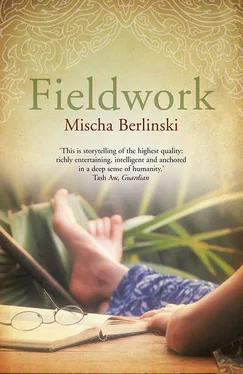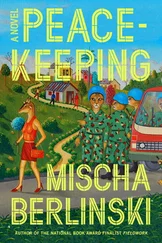After dinner, we walked back up the hill, and I excused myself to my Dyalo hut, pleading exhaustion. I took a shower and dried myself off and dusted myself with mentholated prickly heat powder and wondered what I was supposed to do with myself now. Then I heard a soft shuffling step on my stoop, and a knock on the door.
TWO. THE HAPPIEST WORDS IN ALL THE WORLD
I KNOW THE HAPPIEST WORDSin all the world.
The happiest words in all the world are "Opium Man," when accompanied by a little knock on the door of your hut and the old Akha man's shuffling step. "Come in," you say. Then the Opium Man lies down on the bed with you, both of you on your sides, facing each other, a little paraffin candle between you. Only a lover lies in bed with you like the Opium Man. He pulls a sticky pouch of black opium from his pocket, and lights the candle and prepares the pipe, heating the opium over the open flame, working it carefully until it is a perfect sizzling ball, then plunging the bolus into the pipe. It is not even necessary to lift your head while you smoke: the Opium Man holds the pipe while you inhale. I know all about the Opium Man, because opium makes you endlessly inquisitive. I speak to the Opium Man in my halting, hesitant Thai, and he replies in his thick Akha accent. The Opium Man can be talkative or silent, as he wishes, because he has the self-assurance that comes from being truly desired. I know about his little village and his pigs, his daughters and the bride-price he is expecting for them; I know that it is difficult for the sad Akha to follow the Akha zha when they wander down from the mountains to the Thai villages of the plains, where the lowland merchants cheat them and the children mock their rustic ways. The Akha man, himself a smoker, asks me questions, and I tell him about Martiya van der Leun.
When Vinai knocked on the door of the little hut, the pipes that I had smoked in anticipation of his arrival had wrongly rendered him a familiar figure, an old friend. He stood half a head shorter than me, and I am not particularly tall; but when he lay on the bed with the Opium Man, he sprawled and seemed big. He said he was a member of the Rotary Club of Chiang Rai, and asked if I was a Rotarian also. He seemed disappointed when I said I wasn't. I had decided that he was as distant and elegant as a headwaiter, then he belched; I had decided that he was tight-lipped, then he spoke for hours. It is a cliché to speak of the inscrutable Oriental — but clichés exist for a reason. Talking to Vinai, who was himself Dyalo, gave me some sense of how difficult it must have been for Martiya to penetrate the life of a Dyalo village. All those strange smiles.
Khun Vinai took my place on the bed. He was distracted, and said something about roofing tiles. He had driven all the way to Chiang Rai that afternoon, but the tiles he was looking for hadn't been available. He had wasted his afternoon.
The Opium Man made him a pipe, and Khun Vinai smoked it down in a single lungful. He held the smoke a long time, and then exhaled long tusks that hung below the ceiling of woven grass. He relaxed visibly. This was not the first time that I had smoked opium — I had, after all, lived in the Golden Triangle for almost two years — but the drug this time was different. The last time that I had smoked, with Rachel, a half-dozen pipes had rendered me pleasantly sleepy and lethargic. But now I was almost trembling. The only light in the hut was the Opium Man's candle, casting long pale shadows on the thatch wall.
Finally Vinai spoke, "Martiya, she is my good friend. It is too sad story, Martiya's story. I miss her too much."
Then he lapsed back into a long silence.
Khun Vinai propped himself on one elbow and looked at me. From my angle on the floor, I saw his bare feet, horny and calloused; then his short legs in a pair of khaki trousers; then a polo shirt with a little alligator above his heart; then a well-shaven Dyalo face, with mellow dark eyes, an unlined forehead, and a head of uncombed spiky gray hair.
Once he began to talk, all his reserve melted. Like many a man who reckons that he has made a success of his life, he was eager to tell his story. For twenty minutes or more, Khun Vinai narrated in my direction, occasionally making eye contact, but more often than not directing his conversation to a spot above my head on the bamboo wall. He spoke fluent English, but for an unflagging reliance on the present tense. I listened patiently, waiting for him to get to Martiya, and eventually he did.
As Khun Vinai spoke, I took notes:
— born in Dyalo vill., north of Burma's Shan state. So remote, hunt monkeys in forest with poisoned bow and arrow
— youngest of five children, only child in his family to survive to adulthood. Mother afraid spirits, sure that Khun Vinai die as well, insist he flee
— no possessions but the clothes on his back & his grandfather's gourd pipe, fled across the border to Thailand. Just fourteen.
— CHIANG MAI. Made a living — manual laborer and porter. Learned Thai, and some English also, contact w/ westerners
— Good w/languages — brought him 1974 to Martiya vdL's attention
— A dollar a day to go Dan Loi!!!
— How $ me then! Today — Toyota tr., then — no eat
The next morning, I would translate the last line of the notes above as: "You have no idea how much money this was to me then. Today, I drive a Toyota truck, but in those days, I barely had enough to eat."
On his left wrist, Khun Vinai wore a Rolex. Although his watch probably came from Chiang Mai's counterfeit bazaar, just like my Cartier, poverty had clearly taught Khun Vinai the value of things.
Khun Vinai told me he spent almost two years with Martiya in Dan Loi. He was like Martiya's shadow in the village: the two spent day after day together, interviewing the villagers or taking genealogies. When Vinai realized just what Martiya was trying to do in Dan Loi, when he had finally figured out just why Martiya was asking all those questions and just what Martiya was writing down in her notebooks, Vinai became an enthusiastic partner in her work. When her Dyalo became conversational, Martiya would interview the women privately about those things which they will not discuss freely in front of men; and he would talk to the men. At night, they would compare their findings.
When Martiya was ready to go home, she took Khun Vinai aside. She said, "Vinai, you did half of the work up here, I think you should take half of the leftover grant money." At first he refused. But Martiya insisted. "She takes a fifty-baht bill, lights a match, and burns the money," he said. "She is about to burn another bill, when I say okay. I take the money. It is almost twenty-five hundred dollars. That's how I start Hiker Hut."
Khun Vinai took the pipe from the Opium Man, inhaled, and passed the pipe back. "I owe Martiya everything," he said. "I always tell people that without Martiya, I probably am dead."
Martiya went home to California, then came back to Thailand. Over the next decade, Martiya and Khun Vinai saw each other frequently. They developed a friendship. When Khun Vinai married, Martiya was present at the wedding feast. Khun Vinai recalled Martiya dancing all night around the bonfire, and then in the morning, because Khun Vinai had no close female relatives in Thailand, he had invited Martiya to participate in the ritual kidnapping of the bride from her family's hut. This Martiya had done with great style, shrieking like a real Dyalo woman as she grabbed Sang-Duan from her bed. Then, when Sang-Duan gave birth to Khun Vinai's first child, a lovely girl, Martiya had been present also at the soul-gathering ceremony, where the child's souls were bound up in her body on the twelfth day of life. It was Martiya who accidentally gave the girl her nickname, when she remarked, innocent of yet another Dyalo taboo, that the girl had kissable lips. Sang-Duan's mother had been horrified by the remark, but Vinai thought Martiya's gaffe hysterical, and the name stuck: the girl was Kiss-My-Lips. A few years later, Khun Vinai's first son was born, and a few years after that, another girl, and Martiya helped gather up the souls of those children as well.
Читать дальше












